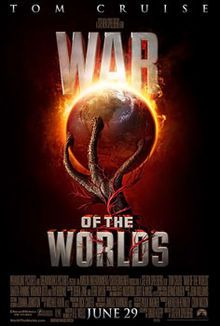The War of the Worlds
 1953, Paramount Pictures
1953, Paramount Pictures
"Yet across the gulf of space... intellects vast and cool and unsympathetic regarded this earth with envious eyes, and slowly and surely drew their plans against us."
Seventy years later, The War of the Worlds still manages to impress, even with its dated acting and stilted dialog. A tight script, professional production, and Academy Award-winning special effects—not to mention fine direction, editing and sound design—make this a textbook example of how to do it right. I still can't get over how waaay-ahead-of-their-time the alien spaceships look—menacingly sleek, gorgeously handcrafted, and consequently far more convincing than many current-day CGI efforts, which tend to be ridiculously enormous and overwrought with meaningless detail.
This has always been—and shall certainly remain—a top-top favorite. A precisely-timed sequence still sends chills up my spine: Pastor Collins, during a futile act of good faith, is slaughtered where he stands; his niece releases a blood-curdling scream; and Colonel Heffner bellows, "Let 'em have it!" The shots of downtown Los Angeles, streets empty and desolate, remain haunting, while some of the montages of destruction, underscored by literate narration, are genuinely harrowing. "It was the beginning of the rout of civilization, of the massacre of humanity." Snicker all you want at its 1950s sensibilities and obvious matte lines; undeniably, at its heart is an earnest greatness.
As a little aside to our current crop of "great" filmmakers who seem to believe films are only "great" if they're absurdly long (James Cameron's sequel to Avatar is three freaking hours), consider this: The War of the Worlds is a mere 85 minutes, yet it feels just as epic and satisfying as any of today's mega-movies—which, honestly, tend to be more exhausting than entertaining. There's something to be said for efficient storytelling.
Thankfully, Criterion Films and Paramount Pictures undertook a full restoration of the film in 2020, and spared no expense. Some critics have complained that the restored images often seemed excessively dark. However, extensive research on the production (the disc is chock full of fascinating bonus docs) revealed that the filmmakers intended it to be just that way. What happened is this: early prints were excessively brightened in order to "read" better on television. Consequently, people have grown up with distorted expectations of how the film should appear. They will simply need to watch it with new eyes.
Incidentally, the artificial brightening of the film for television caused more than just aesthetic damage; among other things, it made the wires supporting the Martian ships clear and obvious, ruining the effect, whereas when the picture is displayed at the proper brightness, they are virtually invisible. I'm here to tell you the restoration is simply magnificent—it quite literally brought tears to my eyes. And no, they did not digitally improve any of the visual effects; they treated the film—arguably the father of the special-effects blockbuster—with the utmost respect.
And speaking of respect, this is a film that absolutely should not be remade. When a film is as important to the industry as this one, a remake only sullies its significance.
"Guns, tanks, bombs—they're like toys against them!"
DKS 12/17/17
Rev 7/8/22
GRUMPY OLD FART-O-METER® Rating:

War of the Worlds
 2002, Amblin Entertainment et al
2002, Amblin Entertainment et al
I'm sorry, but all Steven Spielberg accomplished with this ill-conceived "reimaging" is tarnish the original's fine legacy, and casting egotistical loon Tom Cruise didn't help matters. If we're not supposedly being impressed by Cruise's "look at me, I'm acting!" antics, we're being awed by a glut of deafening, retina-numbing special effects. Although he remained more faithful to H.G. Wells' original groundbreaking novel of 1897, Spielberg seemed to miss multiple opportunities to do more interesting things with the material. Oh well.
DKS 12/17/17
Rev 7/6/22
GRUMPY OLD FART-O-METER® Rating:

